Final update!
April 2nd: The past couple of weeks have been a blur for sure, but…
WE DID IT!

After sending 22 outreach emails/messages…
Having 11 meetings with prospective clients…
And submitting 5 proposals for review…
I ended the 30 day challenge with 3 booked clients for $9,000 in revenue.
It was a lot of work, but man, was it fun!
Honestly, going into this challenge, I wasn’t even sure that I’d be able to hit $1,000… so breaking the $5,000 goal was mind-boggling for sure.
But I think having such a big goal was THE REASON I was able to blow past the $5,000 mark.
It forced me to think big…to be aggressive and to get super creative and scrappy with everything I did.
Like how I followed up with someone after seeing a random comment on Facebook. Who does that?
Someone who wants to win!
While I might have been able to push the gas pedal down this week, the simple fact was I ran out of time for outreach.
I needed to focus all my efforts on actually doing the work for my clients in week 4.
So, as you guys know, we pivoted the challenge a bit going into last week.
Instead of just me reaching out to clients, I decided to help you guys!
My goal was to help 5 of you land contracts. Just to see if all of us working together could actually make more than $5,000 in a single week.
I was blown away by the response. In all, I received over 20 proposals to review last week.
And together, we worked on all kinds of pitch emails, including;
- One reader, who sent her first proposal ever (!) to a client and heard back almost immediately (Congrats Sarah!)
- One person, who wasn’t doing freelance writing, but was looking to start a blog and eventually make money blogging, so they needed to pitch an influencer (Awesome work Ilaria)
- One reader, who was already working with a client but wanted to ask for more business (Tim, you crushed it!)
- And one incredibly hard worker, who was trying to land a client on retainer. I worked with him to rewrite his pitch several times (Great job Amit!) Btw, if you’d like to see the feedback I gave Amit on his original pitch, click here to see the before. And to see where it finally ended up, check out the “After” here.
- And much, much more
I don’t have the revenue numbers for everyone involved, but I can tell you that many of you made incredible progress toward your own freelance goals and I’m very proud of you.
Thank you to everyone who followed along with the challenge.
It was an honor to go through it with you guys. And I hope you can see it’s more than possible for you to go from $0 to making a decent living freelance writing.
I’m nobody special and I did it.
And with a little hard work and a lot of determination, I know you can do it to.
As always, you can hit me up in the comments with any questions you have.
Or head on over to Rob’s blog where you can sign up for my email list and chat with me over there. Peace out!
Week 3 update!
Week 3 of the $5,000 Freelance Writing Challenge is over and…

We blew past the goal!
I booked an additional $5,500 in projects this week. That brings my total earnings from The Challenge to $9,000 and we still have a week to go.
Despite the big earnings number this week, I did run into some significant challenges, which I’ll tell you how I managed below.
I also want to add a little twist to the challenge this week to see if I can help 5 of you land a client as you follow along with the challenge at home.
First things first…
Here’s a look at last week by the numbers: I sent 0 cold outreach emails, 2 follow up emails (on the proposals from last week), and signed $5,500 in contracts.
I was also 550 miles away from my home in Nashville, TN on a work trip to Charleston, South Carolina.
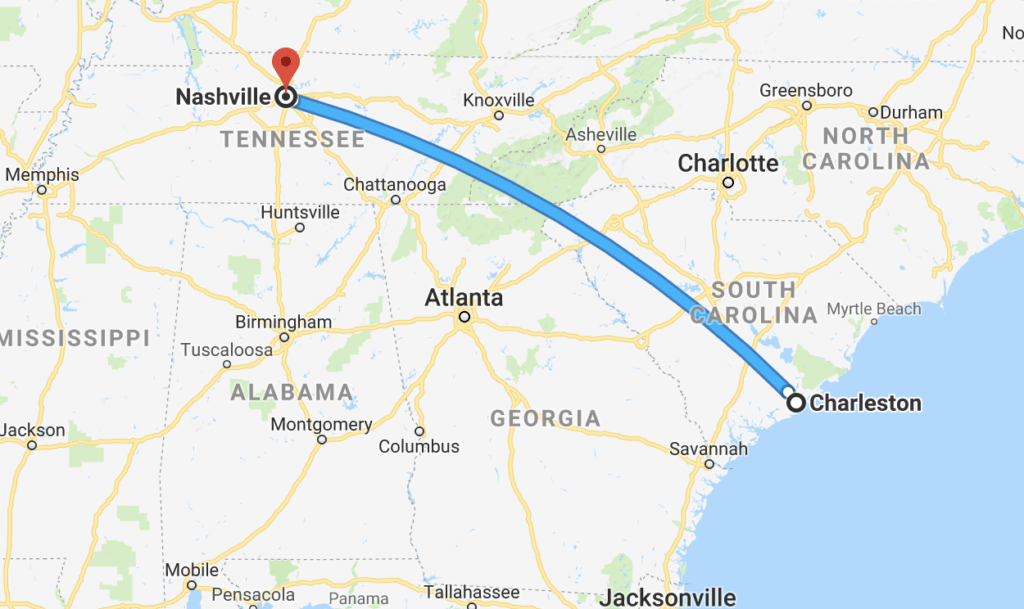
As much as I tried to prep for the travel, it added an “x-variable” to this challenge that made freelancing REALLY HARD.
Carving out time to work in the same, predictable way that I did when I was at home was almost impossible.
Don’t get me wrong, Charleston’s a beautiful city with amazing food. But almost every evening after work was filled with dinner and drinks with my co-workers NOT freelancing.
The only time I could reliably work on The Challenge was in the hour or so I had before heading in to the office.
And most of that time was dedicated to working on the projects I’d landed during the first couple weeks…
Needless to say, I was nervous to get the business I’d sent proposals to last week.
So getting them was a huge relief. But please understand it wasn’t luck.
This week was testament to what we’ve been focusing on the whole time: finding high quality prospects and sending them powerful ways we could help them.
Yes I was nervous. And yes I didn’t have much in my pipeline if things had gone wrong, but because we’d taken the time to send great personalized emails the first time, we got two “Yeses!”
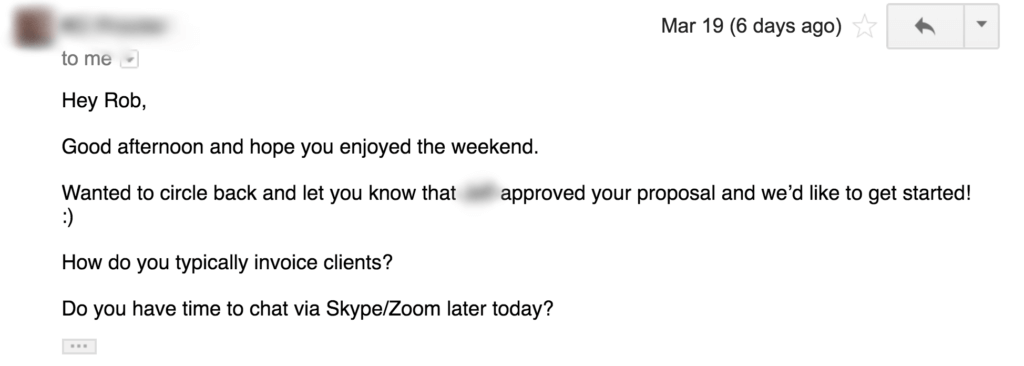
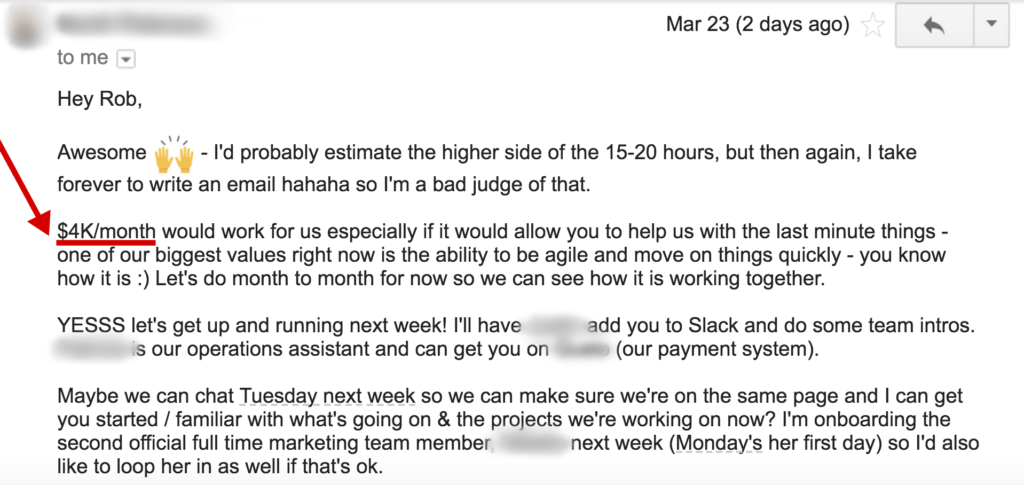
And here’s what’s really cool: One of the clients actually wanted to work together on retainer.
So that means not only will I have the chance to earn $4,000 with them this month…but I’ll have the chance to do that every month for as long as they want to work together.
Isn’t that awesome?
Behind the scenes: How I turned a random Facebook comment into a $1,500 client
Remember last week when I saw this comment on Facebook and sent an email pitch for the business?

Note: this comment didn’t come from any special group. It was in my feed because a friend commented on it
Well this week, I wanted to walk you through the entire sequence of how I took that random Facebook comment and turned it into a $1,500 client.
Because I think you’ll see that this process of finding great clients and doing work with them can be a lot of fun — if you’re willing to do things a little differently than everyone else.
So here we go!
You might remember from last week that the first email I sent was straight forward.
All I did was take the topic on his mind — fixing his webinars — and put it right into the subject line.
SUBJECT: “Need webinar funnel help?”
The email itself is rather short. But I do want to point out a couple of things that make it powerful.
- The picture of me. While the picture might seem weird to include, I’m doing it for a reason. This guy likely gets thousands of emails per day and I needed to do something to stand out. The subject line I chose helps, but this image makes that email pop. You might think: “Who does that?” But that’s exactly the point! Plus, it kind of humanizes something that can seem SUPER impersonal: a cold outreach email.
- The proof that I know my sh**. Notice that I say “I’m direct response copywriter with deep experience in webinar funnels, PLF and email.” The reason I chose to use the acronym “PLF” was because I wanted to signal to him that I am an industry insider who knows what I’m talking about. PLF stands for “Product Launch Formula” and it’s a very popular way that internet marketers launch their products/lead into their webinars. I’ve seen this entrepreneur use this method to launch his products in the past — so I wanted to signal to him that I know what I’m talking about.
- Notice the call back to the Facebook post. I point out that HE SAID he needed help with this. In this way, I’m not having to create a “need” for what I do or say specifically that he has a problem that I found. Remember, he said this was a problem. So it’s pretty logical that he would at least spend 10 minutes trying to solve it on the phone with someone.
And because of that, this response came back the next day on March 14th!

So I set up the call and that’s when the real work began.
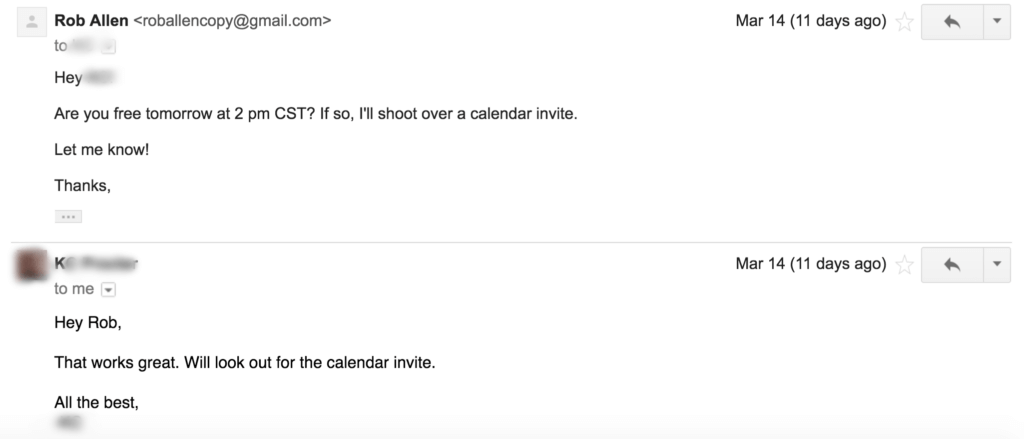
I’d already been on this guys email list for years now. I’d seen him launch several products, but I wanted to make sure that I knew everything there was to know about the current webinar process BEFORE our call.
So in between the time when I set the meeting and our call, I opted in to every single funnel on his site with a new email address.
And I made sure to take meticulous notes of everything that they were doing well in the funnels and areas that they could improve.
This allowed me to get on the call prepared and already have a good idea of where I wanted to lead the conversation.
THIS IS HUGE.
Note: most of your competitors will not do this single step before they hop on the call with a potential client.
But it can make or break potential business.
You always want to ask yourself, “What is the client currently doing? How could that be better? And what knowledge could I bring to the call that would make working with me seem like the only logical conclusion?”
For content writers, you could see what type of content your prospect is already writing about (or should be writing about) and come up with a list of ideas or a content strategy before the call.
For those of you who write emails/sales letters, you could see what kind of emails/sales pages your potential prospects are already leveraging and brainstorm ideas for what else they could do.
For those of you who write books or ghostwrite, you could see what types of works your potential client has already written and show them that you understand the types of themes and characters they work with.
My old boss, Ramit Sethi, calls this “pre work” The Briefcase Technique. And he’s got an excellent video explaining it in more depth here.
But the key lesson is this: do a little extra work BEFORE the meeting and it gives you a huge advantage.
My call went great in this case because I did a ton of work beforehand.
PLUS, when I followed up afterwards, I was able to send a hyper-targeted proposal for the work I could do for him.
Check out the full email first then I’ll break down what’s going on:
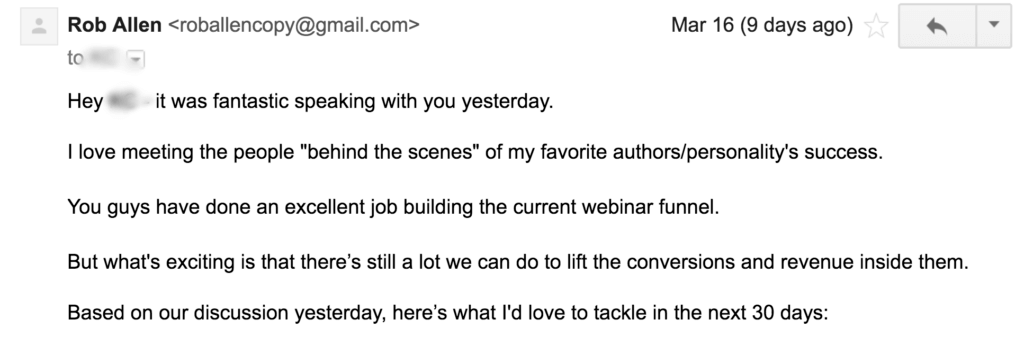
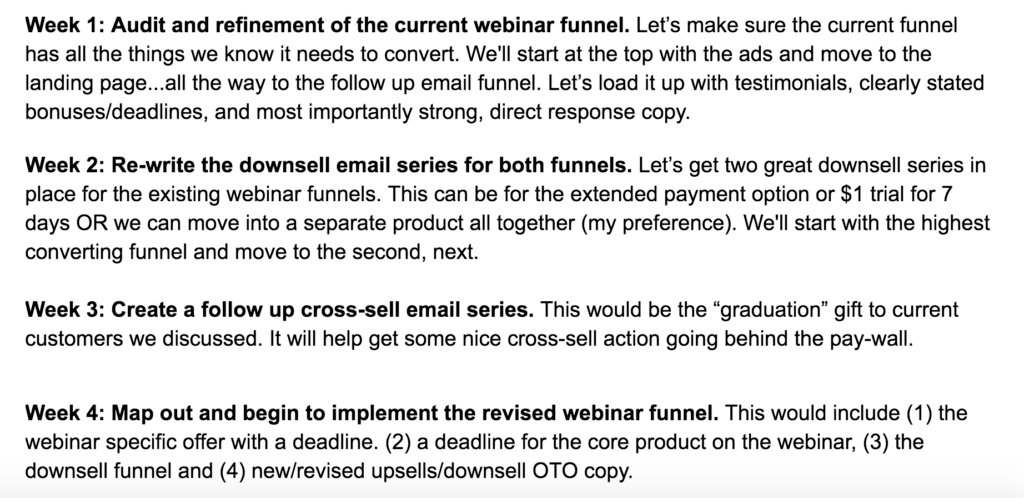
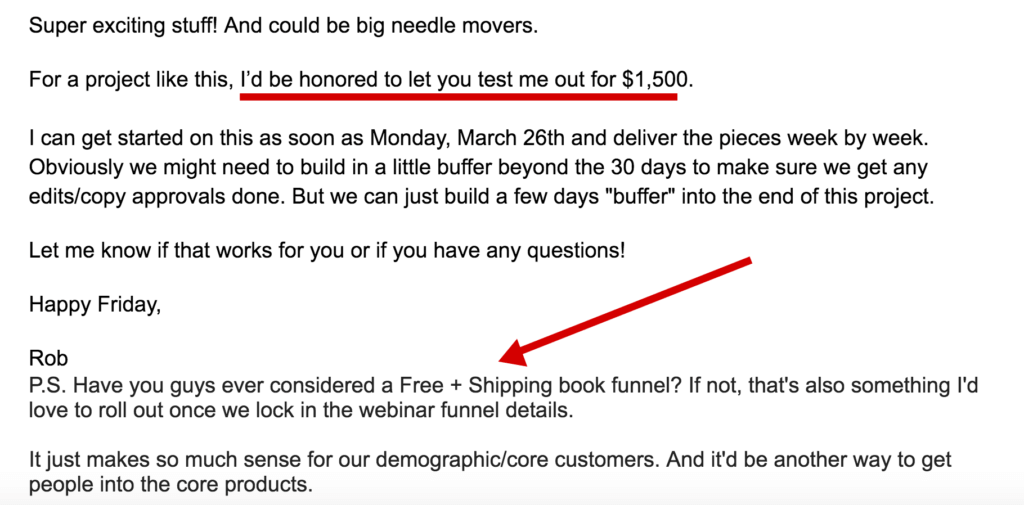
So there’s a lot going on in this email that we can unpack here.
First of all, in the opening couple of lines, I’m giving him a compliment and re-iterating the problem we discussed on the call: The fact that there’s considerable work to do on the conversions and revenue for his webinar funnel.

Then, I move into a very specific proposal where I outlined what I could do over the next 30 days.

All of these were hot-button issues that we discussed on the phone.
But I wanted to lay it out week by week to make it crystal clear HOW we could solve his problems over the next 30 days.
If I had dumped all these items into 1 list and just sent it to him without breaking them down week-by-week like this, it would have lost a lot of its impact.
Imagine if you were the client getting this.
Imagine you knew what problems you were facing with your webinar funnel.
If you got an email with a plan like this to remedy each of your problems, step-by-step over the next 30 days, how would that make you feel?
You’d probably let out a huge sigh of relief just READING IT.
And that’s exactly the feeling I wanted to engineer in my prospect. You can do this to if you take careful notes on your call and always go the extra mile outlining specifically how and when you’ll be able to finish things up for your client.
And then lastly, I want to call attention to a couple of things going on in the pitch for my services and the P.S.

Notice I said, “For a project like this, I’d be honored to let you test me out for $1,500.”
The reason I said “test” was because on our call he said, “we’d love to put you to the test for a month or so and see what you can do.”
I didn’t want to break from that language. I wanted to lean into it. Because if he’d gotten a pitch from me asking for a retainer or to work over several months, he’d have known I wasn’t listening.
And worse, it might have been beyond what he wanted. He viewed this as a test project so I needed to stick with that.
Also notice I didn’t break down how I would do the work hourly.
But I did make it clear that I’d done work like this in the past by saying “For a project like this.”
That makes it clear to the client that there’s not going to be much (if any room) negotiation on the price.
I see so many freelancers ASK for a number here. You do not want to do that. You want to deliver your price confidently and with power.
Next, I put his mind to ease by saying that “we can just build a few days “buffer” into the end of this project” for edits.
On our call, he expressed that having final review of the copy was important to him. So I wanted to acknowledge that.
(Remember, take notes on your call with your prospects!)
And finally, I used the P.S. introduce an interesting idea. The proposal I sent him was hyper targeted to the 30 days for the project.
But here I wanted to nest an idea that I can add value EVEN BEYOND what I displayed here.
I encourage you to always do this when you’re sending your proposals to clients. Just sharing ideas is powerful.
So then I sent the email out and then heard back the same day….

That was a Friday. I had to wait over the weekend for a final update.
And just as I was about to follow up, this hit my inbox early Monday morning.
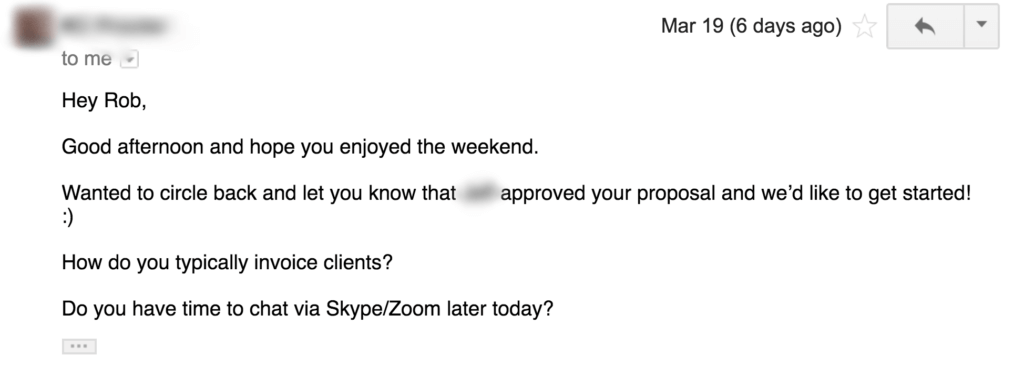
BOOM!
Notice that they accepted the proposal as is! No adjustments or anything. All because of a little extra work I did before the call.
And that’s how every interaction with clients can be.
As long as you’re willing to put in a little work beforehand, YOU can lead them to the sale without any negotiating or price haggling.
And it’s actually a lot of fun.
So that’s how I turned a random Facebook post into a $1,500 contract. You guys can do the same and probably a lot better than me.
“Where else can I find clients?”
Like I mentioned before, I didn’t send out any additional outreach emails this week. But I did still have meetings with 2 clients for new business.
How’s that possible?
I turned my outreach emails/meetings into more business.
And I encourage you to do this too! Because it’s actually one of the most effective ways to land new business without working much harder.
Here’s how it works: Simply ask anybody you have a meeting with if they know anyone who might be able to benefit from your services, too.
I always say something like this near the end of a call, “Man, I enjoyed this meeting today! I’m going to shoot over a proposal for what we discussed today right after this call, but I wanted to ask you real quick: I’m always looking to meet interesting people and would love to know who you think is doing interesting things.Who do I have to meet?”
And just stay silent until they give you the names of a few people.
The nice thing about this is you can usually ask them to introduce you to the people via email. And an introduction will work so much better than a cold outreach email.
But regardless of the business outcome, pause for a sec and think about what’s happening.
Your work is compounding. You’re turning your prospects into a referral network that grows without you having to constantly spend time looking for more leads.
This is really powerful.
Now, obviously you won’t be able to do this every time, but when a call goes well, you can definitely ask for referrals.
And people love to give them:

If you get this loop working well, you will actually get to a point where you have a back-log of client work to do…without applying to gigs on remote jobs websites. They’ll come to you!
Your chance to get custom feedback on your outreach emails
I was on my plane back to Nashville on Saturday and got to thinking: “How could we take the $5,000 challenge to another level?”
And here’s what I decided: I want to help 5 of you land contracts of $1,000 or more.
Since I’m going to be almost 100% focused on servicing the clients I’ve already landed this week, I still want blow our challenge out of the water.
And many of you said you were following along, hoping to learn a thing or two about landing a work from home job, so…
Let’s see if WE can earn $5,000 just next week. Here’s how…
If you’re interested, just sign up here and follow the instructions on the thank you page.
My plan is to help at least 5 of you close $1,000 (or more) in business this week.
I see lots of you guys have questions about this still. The best way to learn is to practice. So let’s try that out this week.
How far can we take our earnings? And can this group earn $5,000 in a single week?
Tune in next week to find out!
Over to you guys!
Did you enjoy this update?
Let me know your opinion in the comments below!
Talk soon!
Week 2 update!
We just wrapped up Week 2 of the $5,000 Freelance Writing challenge and…
It was great all around!
NOTE: I say “we” because it’s not just me doing the challenge any more.
Margaux, Portia, Jenay, Anthony, Amit and dozens of you were inspired to dive in to the challenge with us!
Great stuff! And kudos to all of you who are following along.
This week, I sent 3 outreach emails, had 2 client meetings, and sent 2 proposals for $6,500 in projects.
Those contracts aren’t signed and nothing is guaranteed. So I can’t count them as booked revenue even though I feel good about both proposals I sent out.
So we’re still sitting on $3,500 in booked revenue for the challenge.
Before I take you “behind the scenes” of Week 2, I wanted to tie up a few loose ends from Week 1.
Last week, you guys asked tons of great questions around:
- Landing paying clients without having a ton of samples
- The best resources for writers to sharpen their skills
- And what to say in meetings with clients to get the business
First up, I recorded a video, walking you through entire process of how to find paying clients even if you aren’t using SolidGigs and don’t have a ton of samples to link out to.
Note: In the video, I use Upwork as the example. But the same process applies for any freelance platform or place that you find clients are hiring/need help.
It all come back to 3 simple things: Find the right people, send them a personalized email and get on a call with them.
Second, regarding resources, I put together a quick and dirty guide on the 12 books every freelance writer should read.
And you can download that here.
Over the past few years, I’ve kept running list of the best books for improving your skills as a copywriter/freelance writer.
And these are the books I’ve found to be the most important over the years.
Lastly, I wasn’t able to record a client call this week. But it’s coming! I forgot to ask on the two meetings I was on. And I’d hate to post that without their permission.
Now here’s a rundown of last week.
Finding clients…
In the video above, you guys saw the message I sent to the guy from Upwork.
That was one of my 3 outreach emails. Good news! He responded, and we’re meeting next week. That was pretty straight-forward.
But I wanted to show you guys an unconventional way to find clients.
Because potential clients are everywhere! You just have to be looking for them.
For example, I saw a post on Facebook asking people to share their #1 goal for the week.
And this was one of the comments on the post:
The guy who posted that comment is actually a very successful entrepreneur. And when I saw it, my eyes lit up. Because I knew I could help.
So I drafted up this email and sent it right out:
And this response came back the next day!
The meeting went great. And I feel good that we’ll get something underway soon. Could be about $1,500 worth of business. Not bad for just following up with a Facebook comment!
Doing the work…
I know this isn’t the “sexiest” part of the challenge, but a big focus this week was working on the project that I landed in week 1.
I spent 1 hour before and 1 hour after work each day cranking away on the writing itself. And that was challenging!
Thankfully, I got a first draft of the project done and sent it along to the client for feedback.
I’ll be wrapping that project up this week. So I should be able to get that off my plate soon. And I’ll be able to turn my attention back to more projects for them.
Conclusion
Even though I booked $0 this week, I’m feeling okay going into next week.
The outstanding proposals I have could be big, but, like I said, nothing is guaranteed so I’ll continue with my outreach.
If we’re not able to get started, I’ll share a few more unconventional ways I (and you guys) can go about finding clients.
Back to you!
Are you enjoying the challenge so far? What do you want to see more of next week?
Let me know in the comments below!
Week 1 update!
Week 1 of The $5,000 Freelance Writing Challenge is on the books.
And while I ran into some significant challenges this week, we’re off to a pretty good start!
After sending 12 outreach emails/messages, hearing back from 5 prospects and chatting with 3 potential clients on the phone, I landed 1 client and booked $3,500 in projects.
Going into this week, my #1 priority was finding incredible prospects (clients I knew I could add a ton of value to) and doing whatever it took to meet with them.
While 12 outreach emails might not seem like a lot, the quality of my outreach list and the personalization of my outbound messages was high (a lot it borrows from the cold email templates Ryan previously wrote about).
Because let’s face it: Since I’m only working on this project in my spare time (about 10 -15 hrs/week), I’d never hit the goal doing one-off, $20/hour jobs.
In fact, at $20/hour, I’d need to work 250 hours to hit my goal….And seeing how I’d only set aside ~60 hours for the whole challenge, that wasn’t going to happen.
So getting a big job on the books was something I knew I needed. And I’m happy to have gotten it this week.
Below I’ll share the big takeaways from week 1 and give you a rundown of what happened.
I apologize in advance for the brevity of this message.
But if you guys need extra explanation of anything, have any questions or want more personalized help…make sure to leave a note in the comments.
I’m happy to answer you there.
With that said, here’s a rundown of what happened.
I’ve only got 15 hours a week for project work AND the outreach.
So I had to be hyper-efficient and, more importantly, hyper-protective of my schedule.
The reality is if I miss even one day of planned work, that’s a huge blow.
I love this quote from Tony Robbins. He says, ‘If you talk about it, it’s a dream, if you envision it, it’s possible, but if you schedule it, it’s real.’
So I found 10 hours on my calendar, and actually scheduled it in.
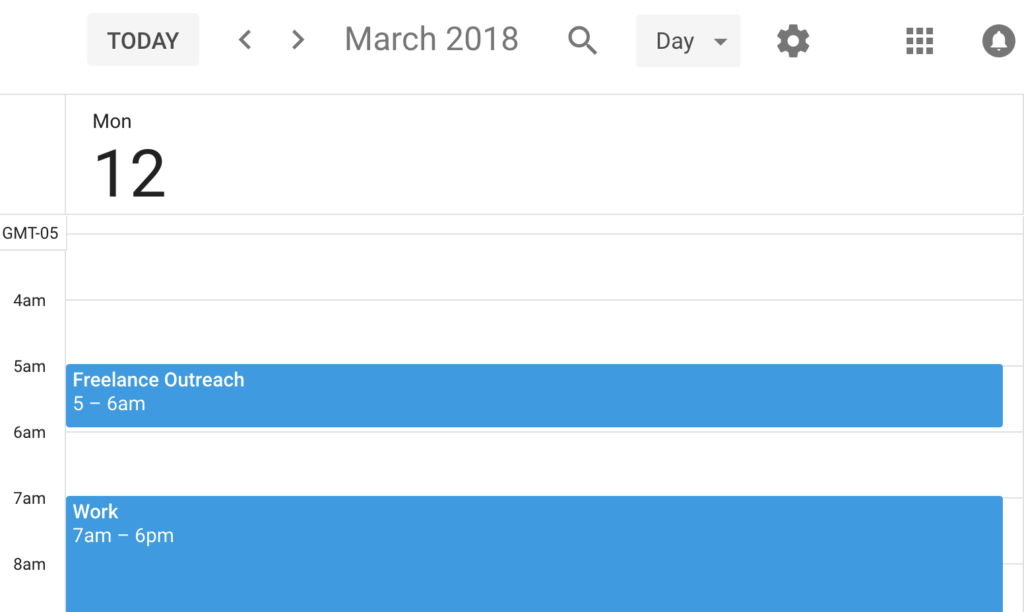
The power of ONE thing
As you guys know, there are hundreds of types of freelance writing jobs you can pursue.
There’s:
- Academic writing
- Generating blog post ideas and writing them
- Copywriting
- Creative writing
- Editing & proofreading
- Technical writing
- And so much more…
The options are almost unlimited.
But for this challenge and for those of you doing freelance work, I would encourage you to pick ONE key area to focus on.
There’s a lot of reasons for this, but the biggest one is that going deep into one area allows you to understand the needs of your clients so much better.
And that’s really important. Because as a freelance writer, you’re not just writing for the sake of writing…
You’re writing to help your clients achieve a specific goal (whether that be more sales, better conversions, more readers, more fans, etc).
And the more familiar you are with how your work fits into those goals, the faster you’re going to succeed.
For me, I choose direct response copywriting.
And specifically, I write for health and financial niches.
These niches are notoriously hard to write for because of the oversight they get from regulatory agencies.
But if you spend the time to learn the nuances of these industries, the gigs can pay quite well.
So that’s the niches and the types of businesses I decided to focus on throughout the challenge.
Next up, the freelance tools of the trade
I don’t use a lot of tools for my freelance business. I pretty much use a laptop (a second monitor), pad and paper, and thesaurus.
That being said, there are a couple of pieces of software/tools/apps that I highly recommend you guys get before diving in.
- Google Drive. I never fiddle around with sending clients Word docs and having 11 different variations of file floating around (_FINAL_NOREALLYFINAL_OKAYFINALFINAL). Google docs ends all of that. It allows for seamless, real time collaboration and commenting. I highly recommend it to every freelance writer.
- Some type of email tracking, scheduling, and template-based inbox service. Email is the engine that drives my freelance writing business. It’s not going to drive traffic to my website in the long run, but it’s perfect for kickstarting conversations. So having a service that helps me automate following up, seeing if people opened my emails and scheduling is key. Ryan recommends Close.io, which is an incredible tool for maximizing your effectiveness at selling, but I’ve been using something similar for years myself so it made more sense to stick with what I was already comfortable with for this challenge.
- Lastpass. I am the world’s worst with remembering passwords. So rather than resetting my password (and wasting valuable time) every time I need to log in to a service, I prefer to let Lastpass handle all of that for me. It’s one click login for everything, which just saves me so much time.
- Grammarly. As one-man shop, there’s nobody other than me proofing my copy before I send it out to clients. And even though it might seem like a minor thing to say “their” instead of “they’re” by accident, clients notice that. So I just prefer to have someone catch those silly mistakes before I send any copy out. And Grammarly makes that easy with their plugin.
- Zoom. This is for calls with clients. And you’re more than welcome to use skype. I just prefer Zoom’s platform and the way they make it easy for people to do one click dial-ins from their phones.
- SolidGigs. This is a service that sifts through the mountain of freelance jobs out there. And they and send you a curated list every week with the best of the best jobs. Jobs that not only pay well but that are backed by good companies. So you don’t have to spend valuable time searching. You just open the email and see if the jobs are a good fit for you. If you guys are short on time (like me), I definitely recommend you give it a shot.
- Plagiarism Detector by EduBirdie. If I’m ever outsourcing drafts, sections or components of my freelance writing work to other writers, I need to run their work through a plagiarism checker to make sure that copy isn’t lifted from elsewhere on the web, which could result in copyright issues or negative SEO effects. This detector from EduBirdie is my personal favorite that’s stood the test of time.
That’s it. I prefer to keep things simple and only add more complexity if I absolutely need it.
Finding clients
Okay so now that we’ve got the basics out of the way, it’s time for the exciting bit: FINDING CLIENTS!
This is the part that makes or breaks freelancers.
And the first thing to understand is that you are not looking for people who you can sell your services to…
You are not looking for jobs you can land…
You are looking for clients who you can help.
I cannot underscore enough how important this is.
You have to make a shift in your mind from SELLING to HELPING.
And once you do, it will help you sort through opportunities much faster.
Because you’ll instantly be able to see who you can help and who you can’t.
For me, I know that I’m going to do direct response copywriting for the health and financial niches…
So I only look for those types of companies. I create my own list first and then turn to Solidgigs to supplement it with opportunities.
On day 1 of the challenge, building my list was my entire focus.
Reaching out and closing the deals
I’m sure you’re all wondering, “What do your outreach messages say?”
But the short answer is: it depends!
Every one of my outreach emails/messages is different. That’s actually the entire point!
You want them to be personal. You don’t want to just carpet bomb list of people with emails that all sound the same…pitching your services.
People can tell when they get those generic messages.
And while they sometimes work out, I prefer to focus on quality of emails sent vs quantity of outreach.
So you’ll notice that I only sent about 12 outreach emails…which normally wouldn’t cut it. I’m still a far cry from needing to employ one of the best CRMs for entrepreneurs with my freelance process for now.
But it’s the quality of those messages that matters.
So let me show you some examples and how the conversations played out.
First up, was an email I sent for a gig I found on SolidGigs.
It was for a financial client that posted about the need for a direct response copywriter.
It was a great potential fit for me!
So I browsed around on their site for a minute and then drafted up this email.
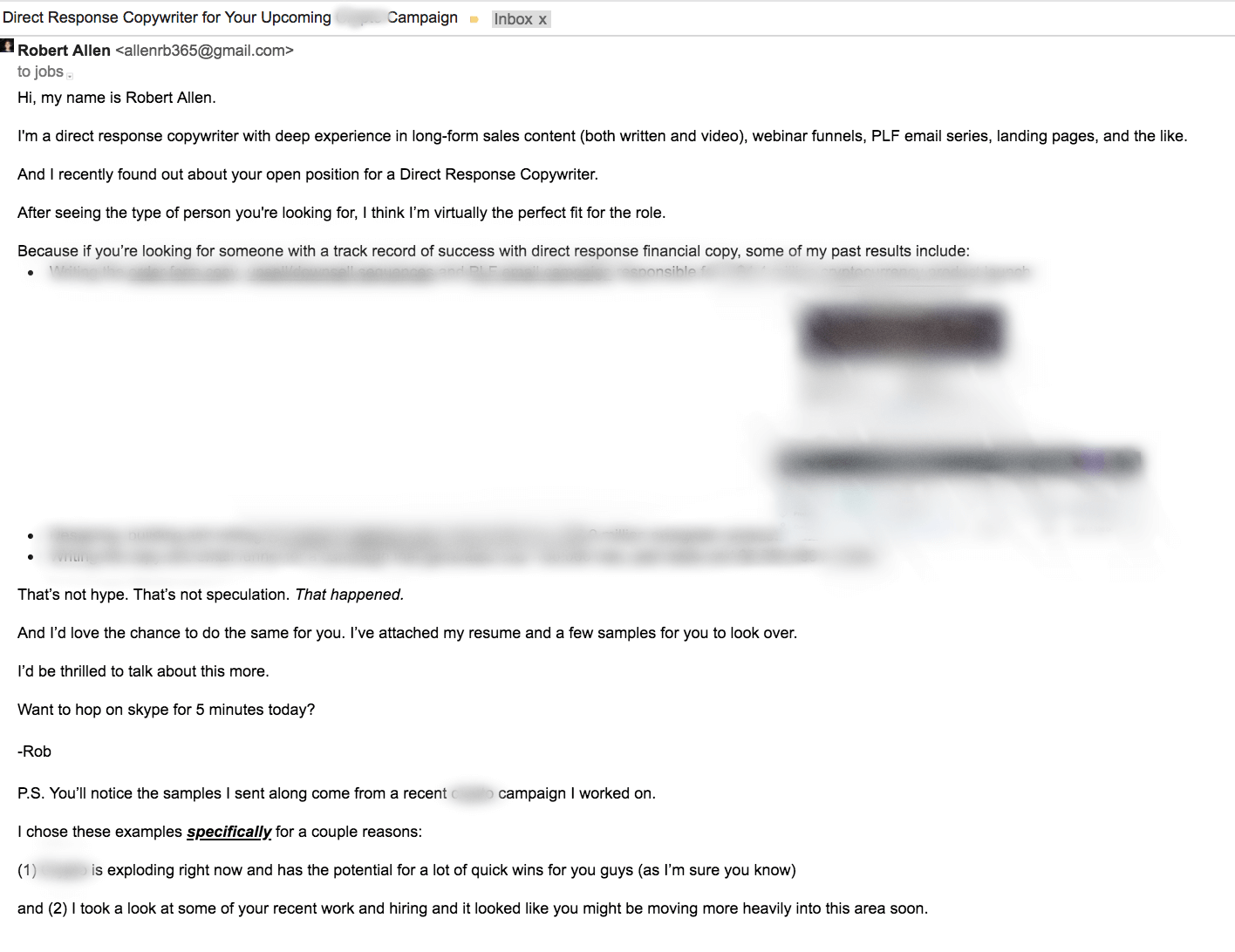
A couple of important things to note:
- Since this company was specifically looking for direct response copywriters, I was able to be direct. There’s not a lot of lead in or beating around the bush. That’s the benefit of SolidGigs.
- Notice that I provided attachments with some samples AND put screenshots right in the email. I gave the screenshots so even if he didn’t open the attachment, he would see some of the things I’ve worked on.
- Notice how I sign off with “Want to hop on skype for 5 minutes?” I actually prefer to use zoom but in the job listing they said that candidates will need to jump on a skype call if selected. So I just went ahead and made it seem like selecting me and taking the next step was a foregone decision.
- Lastly, notice the P.S. of this email. That’s where this email really shines and makes me different. See, they didn’t say specifically what type of campaigns/copy they needed, but I noticed that they were hiring a ton of support roles in one key area of financial copy. To me that was a HUGE tell-tale that they were moving their business in this direction. So I tailored by samples to that.
And that level of customization paid off.
Because I got this 1 hour later:
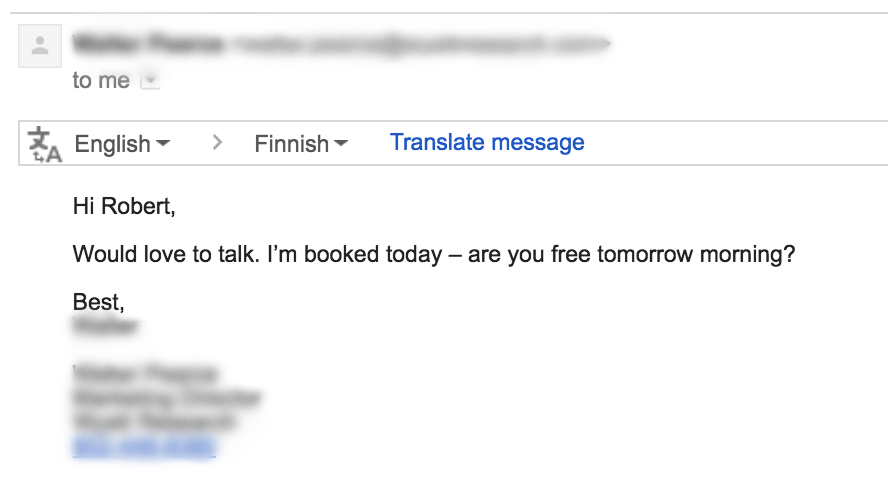
The call went great and it would have been great paying work.
Unfortunately, I had to turn down the business due to a conflict of interest…which was a bummer.
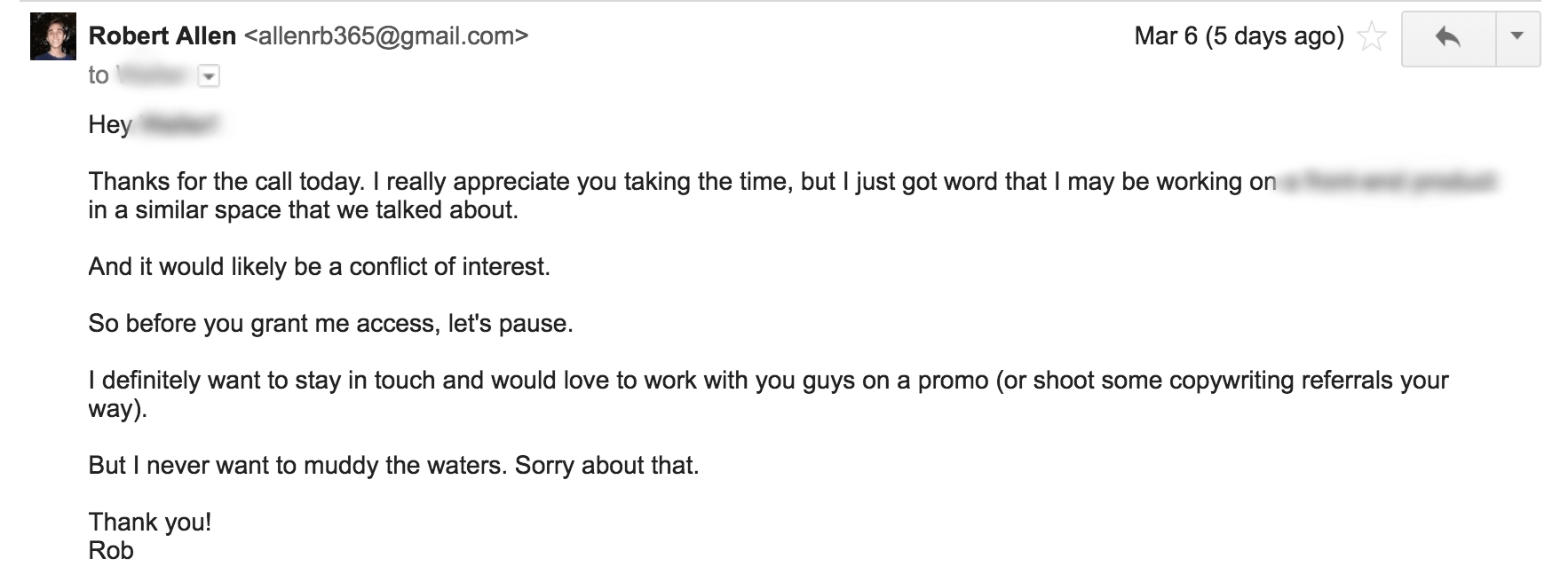
But that happens sometimes. You just have to keep going.
I sent a few more outbound emails without any reply back.
And then an incredible opportunity opened on LinkedIn.
See, I connected to an absolutely brilliant content creator and she was hiring a writer.
And even though I couldn’t do it, , I tried to create real value for her and actually passed along a referral.
Here’s my message to her:
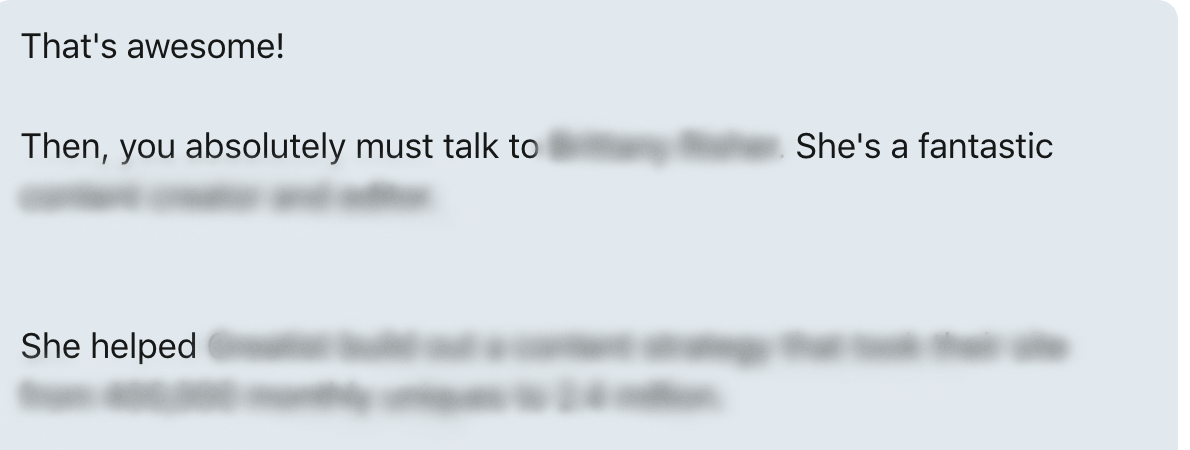
But then watch what happened in her response:
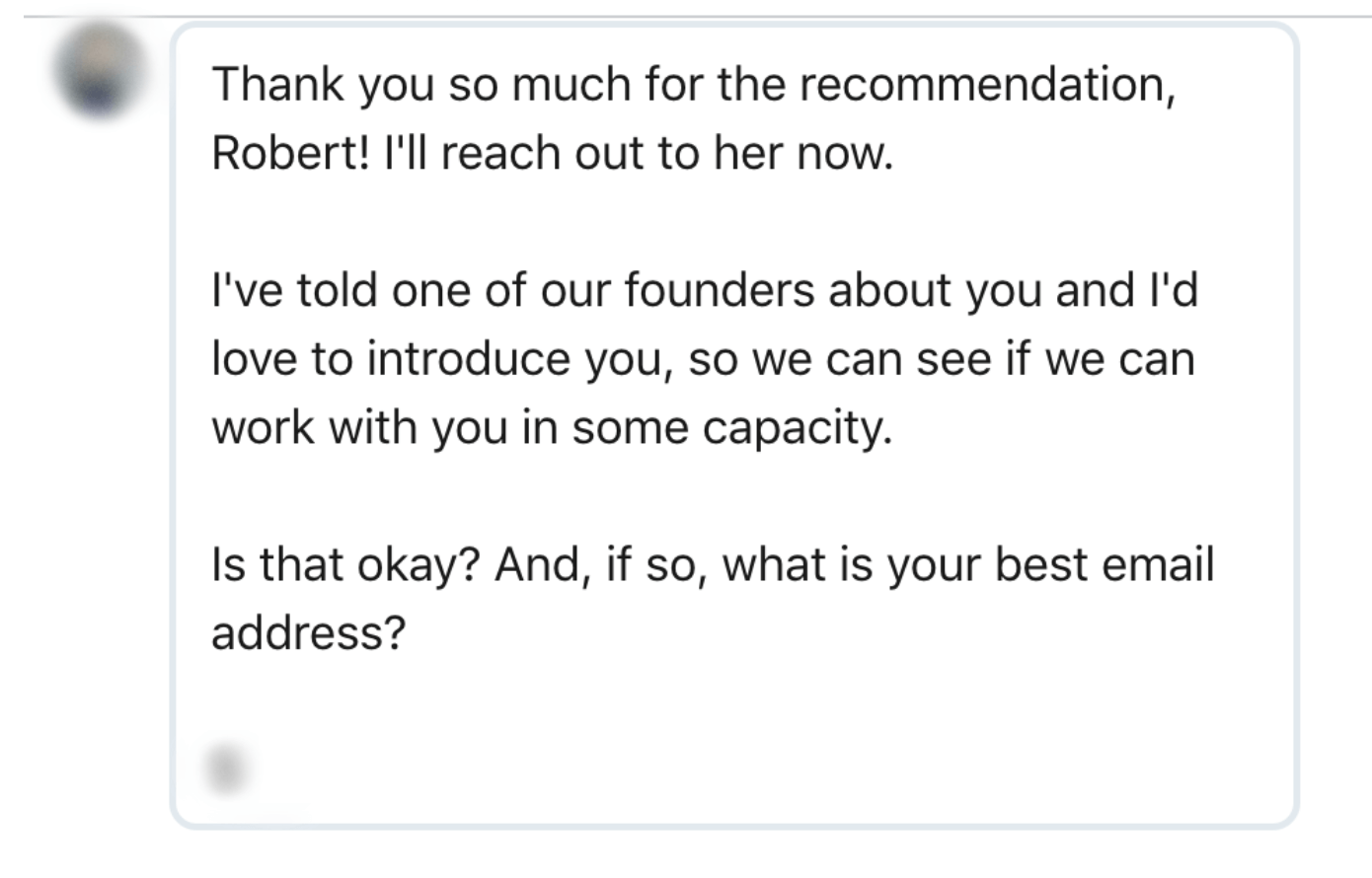
What started out as a referral to another writer turned into an introduction to the founder of the company!
All because I was focused on helping and serving first.
The conversation with the founder went great.
Right after our call, I sent over a very simple proposal, outlining the value I knew I could add to their business and my fee $3,500.

And then look at the response!

See guys, this is not about any magic selling techniques.
What I did was simple: I clearly defined who I could help and how.
The business came as a natural result of that.
And I’m so stoked to work on this project!
Conclusion
All in all, this first week has been crazy.
Outside of the challenge, I just got assigned a huge project at work, which is going to dominate my schedule for the rest of this month.
So going into week 2, time management is going to be KEY again. I’ve got some travel coming up for work, too. So I need to get in front of that with the outreach.
But man does it feel good to have 1 week on the books.
I’m pushing myself hard and pumped for week 2!
Let’s go crush it!
Over to you guys!
What do you think of this challenge so far? What do you want to see more of next week?
Let me know your questions/ideas in the comments below!
I’ll dive in and answer them this week!
Here’s the original launch post…
Here’s the deal. Thousands of you have asked me about how to get started as a freelance writer. Questions like…
Can anyone start freelance writing out of the blue one day and make a living doing it? How hard is it? Where do you find your first paying client?
What should I charge as a freelance writer? Are sites like Upwork and Freelancer actually worth it? How do you make the time for starting this on the side of your day job?
Well… it’s time we do something special to truly answer each of these questions and show you how to go from zero to earning a meaningful income freelance writing (on the side of your full-time gig).
As many of you already know, my own journey starting to freelance began back in 2014 and I grew the business to $160,000 on the side of my day job doing content marketing consulting.
But… a lot has changed in 4 years, and content marketing isn’t quite the same as freelance writing.
So, I partnered up with my friend Robert Allen, to do something insanely cool here on the blog with you for the next 30 days…
He’s publicly challenging himself to earn $5,000 in 1 month as a brand new freelance writer.
Each week, he’ll be updating this post with a check-in on how he’s doing, what his biggest wins are, and where he’s running into roadblocks along the way…
And at the end of the month, he’s giving away $1,000 of his earnings to one of you…
Here’s Robert:

Now, I’m going to let Robert take it away from here to tell you more!
…
Robert: Every time I check Facebook these days, my newsfeed is full ads like this:

While I’m certainly not picking on this guy (who knows?… maybe it really was that easy for him to his millions), I can only speak from my own experience.
And for me, building my side business and earning a living as a freelance writer looked a whole lot more like the squiggly line on this chart than the straight one:
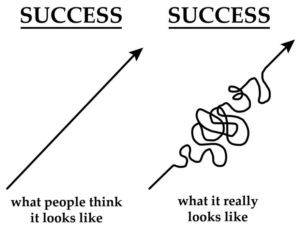
I’m almost embarrassed to talk about how much I struggled in the beginning of my freelance writing career.
I’d do whatever odd-end writing jobs I could get… and settle for the worst clients in the world.
Oh god, when I think about some of those old conversations with clients I cringe.
ME: “Oh so you need 2,000 product descriptions written?”
(Which is about 10 hours of work, btw.)
CLIENT: “Yeah… and I can’t pay more than $50 for it.”
ME: “I can do that!”
**Proceeds to do BELOW minimum wage work… telling myself, “I’m just paying my dues” for the 10th time.**
CLIENT: “Can you write the first draft for free? I just need to get a feel for your writing style before we get started.”
ME: “A draft of the entire project?
CLIENT: “Yeah…”
ME: “No problem! I know you’re going to love it!”
**Pushes send on the email with the copy attached**

Of course, I never hear back from the client.
And just to give you an idea of how little money I was making in the beginning, my first five (yes, 5!) jobs weren’t even enough to meet the minimum payment threshold on Upwork!
Meaning that if I wanted to get paid for my past month’s worth of work, I had to actually log in, choose the “Get Paid Now” option and pay an additional fee for a measly $90.
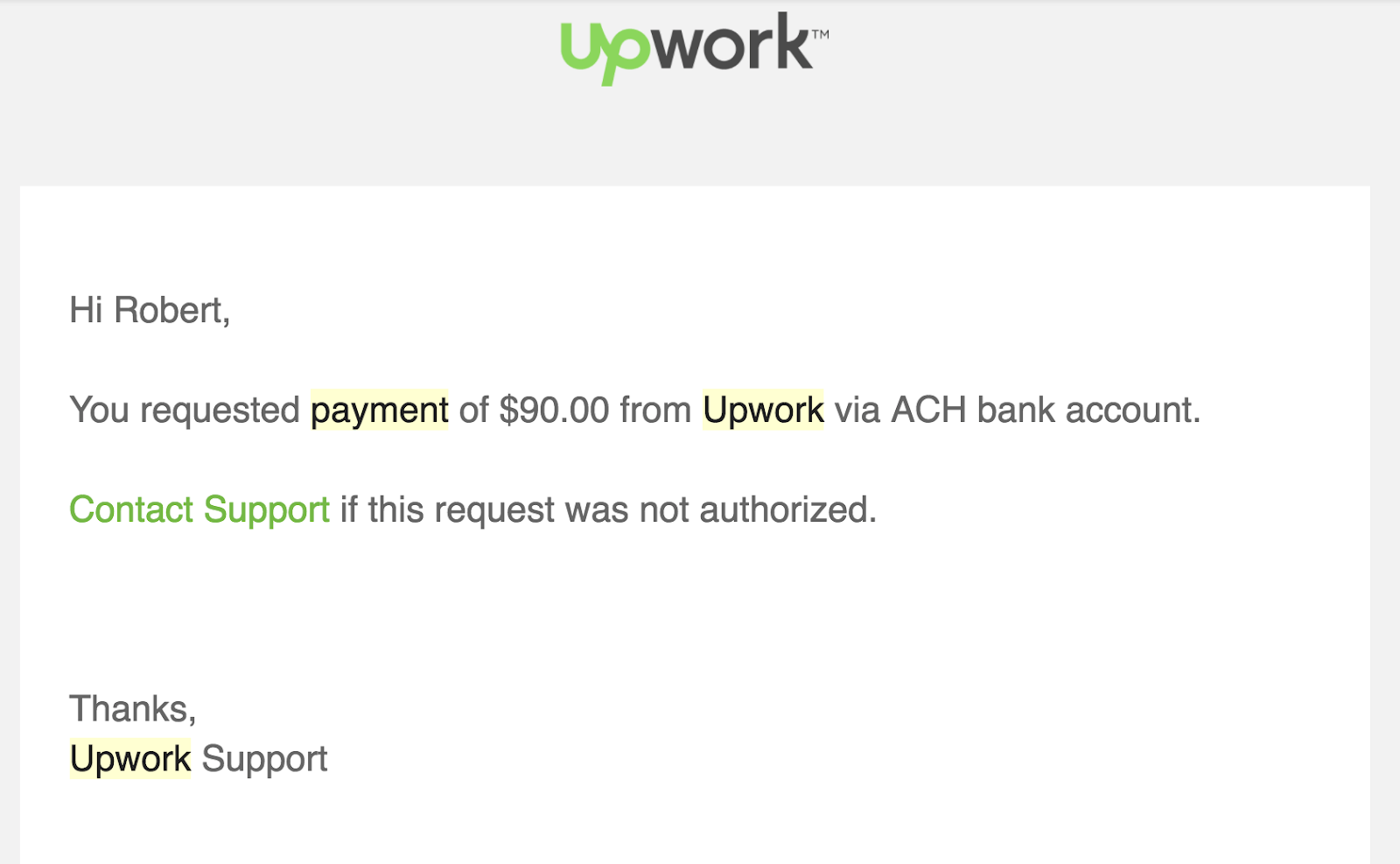
I’ll be honest with you. It was discouraging.
I almost gave up. But thankfully I didn’t.
Because eventually, I caught a lucky break.
I landed a job working for Ramit Sethi’s company, I Will Teach You To Be Rich, helping write content for his emails and blogging courses.
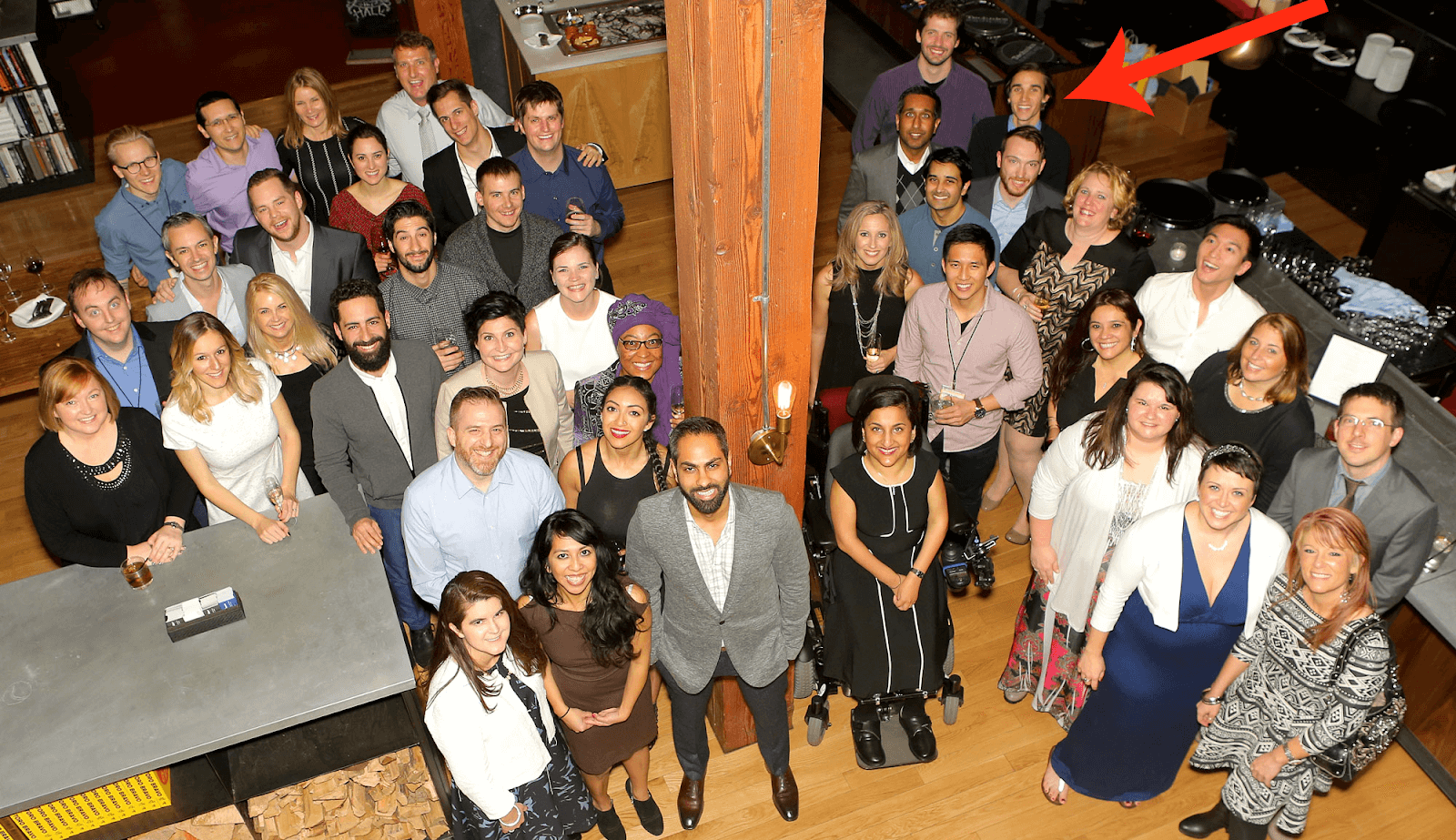
I was the least talented person in the room by far.
But being surrounded by writers who were 10x, 20x even 100x better me, forced me to grow or get out.
I chose to grow and it was a brutal training ground. But I’m thankful for everything I learned.
Because my time there put me on a path to earning well over 6-figures writing.
And more importantly, it set me up for the position I have today freelancing for Agora, a $1-billion-a-year company often referred to as the “Harvard of copywriting.”
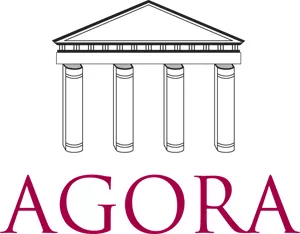
I say all that not to impress you, but to give you some context for the question I’ve been obsessed with,
“Did it really have to take so long?”
If I knew my blind spots going in…
If I’d made less mistakes from the start…
If I had insider tips from someone who’d been there and faced the same challenges from day one…
…. How much faster could I have gotten off the ground?
Tons of people TALK about how quickly they were able to earn an incredible living from freelancing and their side businesses…
Remember those Facebook posts from above!
But Ryan and I were talking the other day and we wanted to know…
“Has anybody actually tried DOING it in real time?”
Well, neither of us have ever been afraid to be guinea pigs.
(You might recall Ryan’s validation challenge)
And that’s what this challenge is all about.
I’m going start over from scratch and try to build a freelance writing business from $0 to $5,000 in 30 days.
Whether you’ve never freelanced before and you’re looking for a place to start…
Or if you’re already freelancing and you’re looking for tips to grow your income (without working yourself to death)…
This challenge can help.
The Goal.
My goal is to create a blueprint anyone can use for freelance writing success.
And over the next 30 days, I’ll cover everything you need to know..
From how to position yourself and find clients….to tips for eliminating writers block…and EVERYTHING in between.
And if all goes as planned, over the next 30 days you’ll discover:
- How I find clients willing to pay me $50/hr… $100/hr… even $500/hr
- The word-for-word emails I send to prospects to get them to work with me
- How to quickly and efficiently write the copy for your side business in less than 10hrs per week (no more staring at a blank page!)
- What tools, sites and software I use to run my freelance business
- The real challenges I face and how I overcome them along the way… in real time
- And much, much more
The Rules.
So here’s how this will work…
Starting today, March 5th, through April 2nd, I’m going to start over from scratch and try to earn $5,000 in the next 30 days.
“Start from scratch” means I can’t use any of my existing clients or contacts.
Because let’s face it: most new copywriters do not have this advantage.
So in this challenge I won’t either.
The other big thing is I must do all the work in my spare time.
I’ll be aiming to do it in less than 15 hours a week.
The reason for this is simple: Freelancing is something most of us start on the side.
We do it while we have a full time job…
And if it takes off, we can always scale up.
But there’s no reason to quit your job cold turkey and just try to hustle your way out of a hole.
It creates too much pressure and stress.
And it’s just a lot better strategy to build your freelance writing career while you have the security of a paycheck to fall back on.
Your chance to win $1,000 in “seed money” for your freelancing business
With those things in mind, every week I’m going to send Ryan an update with:
- My booked revenue (to date)
- The clients I’m reaching out to (and why)
- The challenges I’m facing
- The projects I’m working on
- And any other helpful tips I pick up along the way
And at the end of 30 days, we’ll close the experiment with a full post-mortem on The Side Hustle Project Podcast.
And we’ll be giving one lucky winner $1,000 from my the earning during the experiment!
That’s right!
You have the chance win $1,000 just for following along with this challenge.
We’ll have more more details on how the contest works in the weeks ahead…
But think of it as a “seed investment” in your freelance writing business.
So if you need supplies for your home office…
Or if you want a new computer…
Or if you just want to stuff your savings account full of cash while you’re building your biz…
We might be able to help you out.
Stay tuned!
The next 30 days are sure to be filled with a lot of challenges… a lot insights… and hopefully a lot of fun.
I’ll be back in your inbox next week with a quick update on where we stand.
But until then, I want to hear from you:
“What’s the ONE thing you need the most help with when it comes to freelance writing?”
1. Is it finding clients?
2. Is it the writing process?
3. Is it charging what you deserve?
…
Let me know in the comments below.
And I’ll try to tailor the updates to whatever will give you guys the most value along the way.
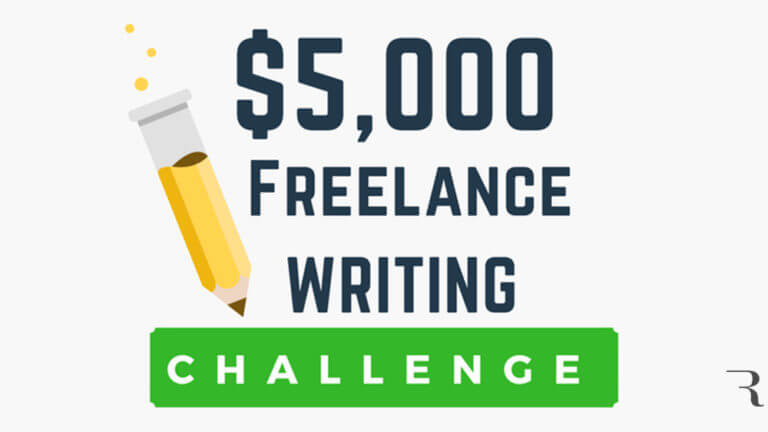
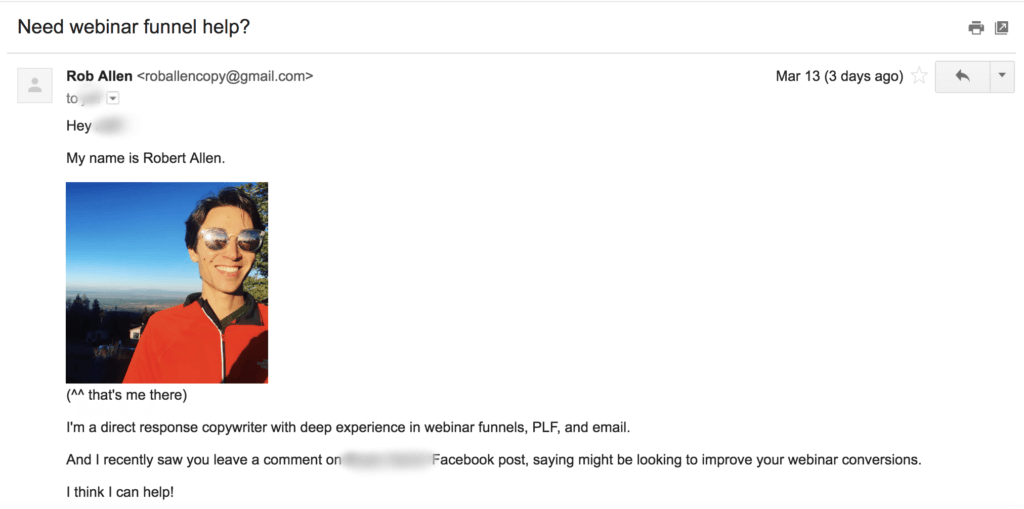



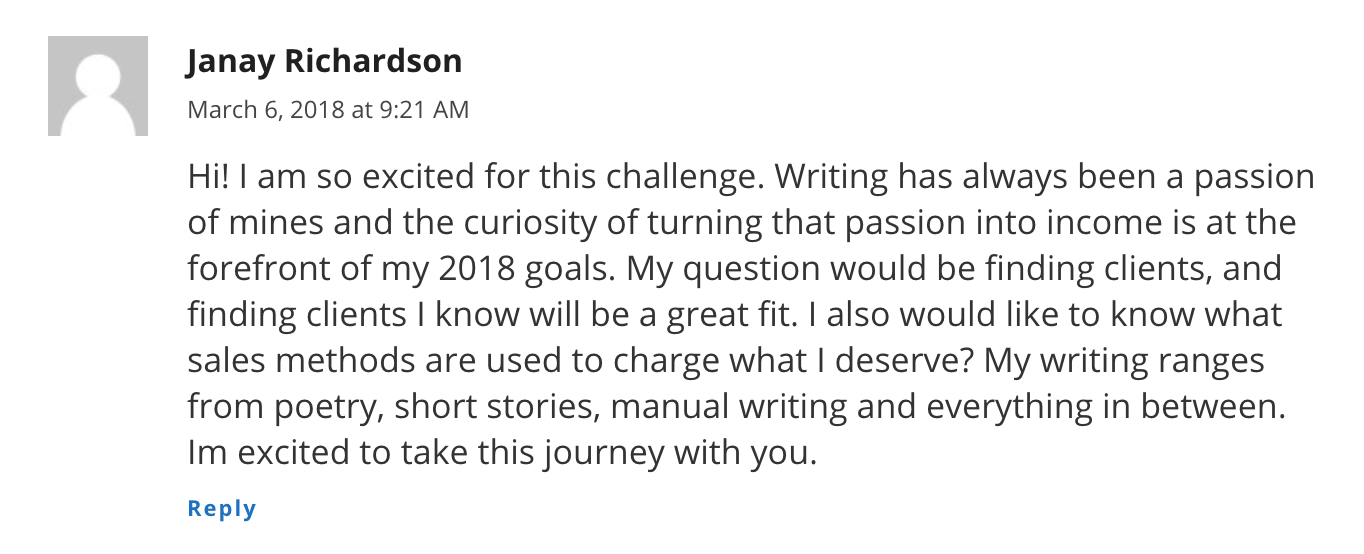
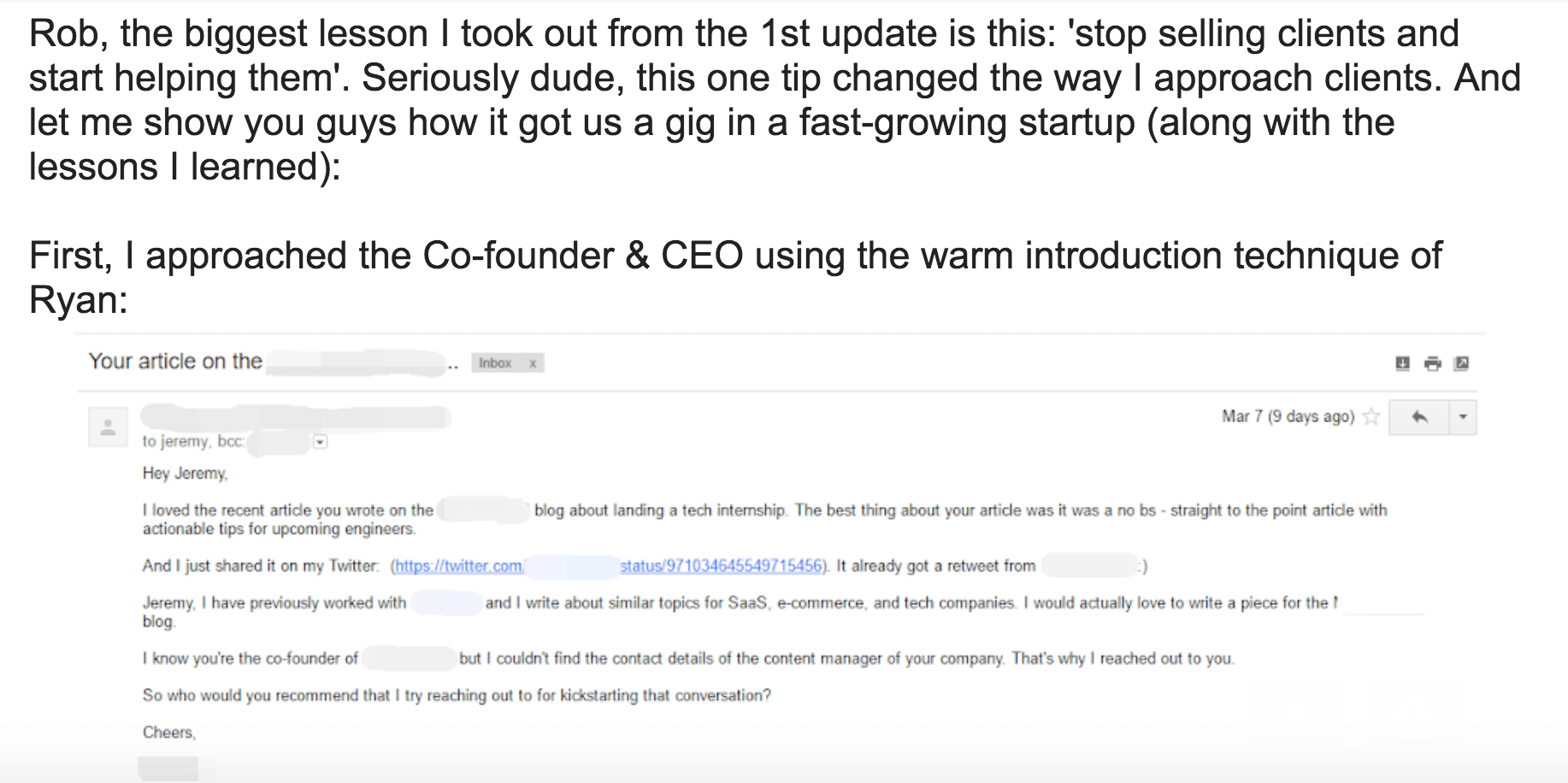
317 replies to “The $5,000 Freelance Writing Challenge: How to Start a Freelance Writing Business (on the Side of Your Day Job)”
I’ve always enjoyed writing and thought that building a career as a freelance writer would be a cool way to use my talent. But I never knew how to get started…what to do first, and then what? I am keen to see how you do this.
Finding clients is most challenging to me.
I have been trying to break into freelancing and finding client has been my greatest challenge. I got so frustrated I had to just keep it aside for a while so I look forward to this 30 day journey.
Really only 12 emails and got three calls. I have thrown like 40 emails for past 1 month but not even and thank message in return.HOW you did that.
Wow! You’re a god. How sweet. I will bookmark your page for more helpful contents.
Thank you very much for this awesome piece.
That’s awesome progress there Bob! My main challenge is finding the emails to pitch. How do you go about that?
Hunter.io is your friend! I’ve used it with good results.
I think you have the advantage of your past experience, but with someone that wants to start, without working previously as a writer of any kind. That ‘ll be the challenge. How do you land a client when you can’t show your past projects? Personalization it’s good, it’s important but experience for a client it’s the key.
I love this challenge, I have decided to so one of my own and challenge myself to earn 5,000k. I will double up on my outreach efforts this week.
I foresee Robert making close to 10k from this challenge!
Finding client was challenging to me.
Finding clients has been the major challenge. I have exactly 0 clients.
Hie Rob!!
This challenge is really interesting and you made awesome progress in only a week!!!! I bet by the end of 30days you would have made more than 10k.
I am really inspired!!
We’ll see! Fingers crossed! A good start but still got a long way to go!
I agree, it’s not really starting from scratch if you already have all this social proof (like all the results in your first email) and have already worked for companies like IWT and Agora.
I’m enjoying this post and what I’m learning, but this experiment is not comparing apples to apples. More like an apple to an apple tree. You have gobs of experience that you can pull out in your resume and previous projects that sells more than any cold email ever could. (I’ve hired at my current company, and no matter how awesome your email, no experience = no call back.)
I would have much, MUCH preferred that you had tried this *without* your no-doubt impressive repertoire of past work to fall back on. THEN it would have been more like what 99.9% of your readers are currently going through.
That said, I wish you luck in your experiment. Thanks for the solidgigs recommendation.
PS: there’s a handful of typos in your second blog, and mistake of that vs who when referring to people.
Hey Cori! Thanks for the feedback.
I do want to clarify though: In 90%+ of my outreach emails, I’m not linking to my previous samples.
The only time I’ll do that is when it’s a specific requirement of the application (like in the SolidGigs example).
But even in those instances, I prefer to just mock up an example for what I want to do for them in a google doc.
I find doing that to actually be an ADVANTAGE over just sending out generic samples of your work.
Because you can tailor your sample specifically to the client and just let them know “Hey this is just a mock up. It’s not finished copy or anything.”
But I normally put ALL of my energy into getting on a call with them and discussing it there.
Those calls are really where you can make a connection with people and get the business with clients.
I’m actually planning to record a few calls so you can see how they go!
That being said, you definitely still want to brush up on some industry trends and know what’s going on – so you can find those opportunities and pinpoint the potential “holes” in a clients business that you might be able to fill.
Hope that helps!
I would LOVE if you were able to record some of your calls. As someone with social anxiety, phone conversations with strangers are particularly terrifying. But, after reading this post today and a couple others previously, I’ve realized that I do need to include phone calls in my reaching out to get clients. For me, having some idea of what I should say and what to expect will help ease that anxiety.
I’d also love a step-by-step guide on how you find these ideal clients to pitch to. Are you just doing a Google search of websites in that niche and then carefully considering each one? That seems far too time-consuming to me… That’s what I’d really like to know more about. I just started my freelance writing business and have only just now gotten an offer for a trial article for a job I applied to through ProBlogger…
Wow! I really enjoyed the update — thanks for sharing it.
Three points came to my mind about this:
1. You did a lot of outreaching: sent 12 emails and got only 1 response.
2. You know exactly what you want to do for them. So it’s not “Guess I can do this . . . I can also do that if you need”. As you said we should be focused on a particular service and persuade people that they can get results from it.
3. Getting people to trust you in your email is the most important thing. You did this by showcasing your previous results (and with an emphasis on being risk-free and guaranteed). Ryan also always recommends using your own blog and the results for yourself as successful previous experiences. Guest posting is also very helpful for blog content writers.
Keep us updated on your progress Robert 🙂
Hello Rob! – Can I say Rob? I’m sorry but I feel like I already know you-. Marly from Venezuela here (maybe you remember me in the previous comments; I’m the girl with renewed hope)!!! I want to know what type of email tracking you use. I also want to know: Is there a free platform that you recommend in SolidGigs style? I cannot pay SolidGigs… It’s embarrassing but I earn only 15 dollars a month. I know it seems crazy, but that’s my salary. (Thank God I have my own house) Thank you! I await your comments
And excuse me, I also want to adhere to Cori’s comment. Your experience (impressive by the way) gives you an advantage over those who, like me, do not have the experience. Keep up the hard work! Thanks for taking the time to do all this.
Hey Marly! I actually use the paid version of MixMax for my email tracking. But you can use a free version that has a lot of the same features. With regard to SolidGigs, this is kind of optional. Until you get to a point where that service fee doesn’t matter, I’d focus your efforts on just sending people messages on linkedin and email that YOU find. Then you can come back to this service.
It’s a great tool. But not 100% essential for your success.
Hope that helps! See my explanation of the samples in an earlier comment. Thanks!
Perfect, your explanation is pretty clear. Thanks a lot!
Hi Rob,
Thanks very much for your insights and the zeal to help freelancers (both new and those already in the business). I really like your post. I started a couple days ago so I am really excited about your 30 day challenge. Hope to learn a lot. Thanks again.
Thank you!
There are a lot of good tips here, but even though you’re reaching out to new clients, you seem to have a stronger foundation than most beginners. I would argue that this isn’t quite “from scratch” as you’re able to reference already created articles and examples of work with other clients, and you have a strong connection to other freelancers.
I primarily rely on articles I have self-published on my website and LinkedIn.
Taking the time to create those high-quality, unpaid pieces is a necessity of starting from scratch but it can easily eat into time that I wish could be spent searching for clients.
Excellent point Jessica. And you’re 100% right, I can’t deny the fact that I do have some industry experience and knowledge that helps me know specifically how I can help clients.
But I do want to be clear: In 90%+ of my outreach emails, I’m not linking to my previous samples.
The only time I’ll do that is when it’s a specific requirement of the application (like in the SolidGigs example).
But even in those instances, sometimes I’ll just mock an example for what I want to do for them in a google doc really quick.
I find doing that to actually be an ADVANTAGE over just sending out generic samples of your work.
Because you can tailor it specifically to the client and just let them know…this is just a mock up. It’s not finished copy or anything.
But I normally put ALL of my energy into getting on a call with them and discussing it there.
Those calls are really where you can make a connection with people and get the business with clients.
I’m actually planning to record a few calls so you can see how they go!
Thanks for the update! It was helpful and detailed!
I still think that the experiment is a little off from what it would ACTUALLY be like for someone starting from scratch. For instance, if I wrote a well crafted email like you did, I wouldn’t have some of the specific niche market examples that you did.
So, I’d really love to see tips and tricks for if you don’t have great solid examples.
That seems to me why so many people are then relegated or stuck to working the $20 an hour gigs, and not making the jump to big $3500 gigs.
So, I’d be interested in seeing how you find and utilize smaller gigs to upsell someone to close on a bigger gig.
Thanks!
Thanks Jacob — and that’s a great point.
But unless it’s a specific requirement of the application (like in the SolidGigs example), I’m not linking out to samples of previous works in my outreach emails.
My outreach emails usually focus on something I know I can help people with…OR something that I notice they might be able to benefit from when browsing around on their sites.
Now, if they ask for samples, sometimes I’ll just mock something up in a google doc really quick.
And say “this is the type of thing I’d like to create for you.”
But usually I put all my energy into getting on a call with them an discussing it there.
That being said, you do need to spend some time understanding the trends in your area of freelance writing and how you can help them to get the ideas for the first place.
And I will admit, I do have that advantage. But in the case of the business, I landed I never sent any samples across.
Hey Robert,
Thanks for clarifying things. The two most important thing I took out from this update: 1. Stop selling and start helping (I mean, really man this advice is pure gold. I’ve already started implimenting it in my biz)
2. Solidgigs: Thanks for telling us about Solidgigs. It’s a solid way of finding qualified prospects. Along with solidgigs, I would recommend you to check out RemoteOk and AngelList. Great places to find high-quality clients.
Robert, I’d love to know how are you approaching clients in your cold emails? I mean, do you directly pitch them your services or you start with a general conversation? And most importantly (before sending your cold email), how do you figure out if the company would be a good client for you?
(Coz I’ve sent some cold emails and also got responses but the prospects said, they are not looking for writers at the moment)
THE HARD PART IS GET CLIENTS WHEN YOU ARE NEW TO A FIELD
SPECIALLY WHEN THE FIELD IT NO CLEAR CUT AND WHEN WHAT YOU CAN DO FOR THEM
IS JUST YOUR APPRECIATION, YOU DO NOT KNOW WHAT THEIR NEEDS ARE
AND I AM TALKING OF COUNTRIES NO SO DEVELOPED AS THE USA
REGARDAS
RON